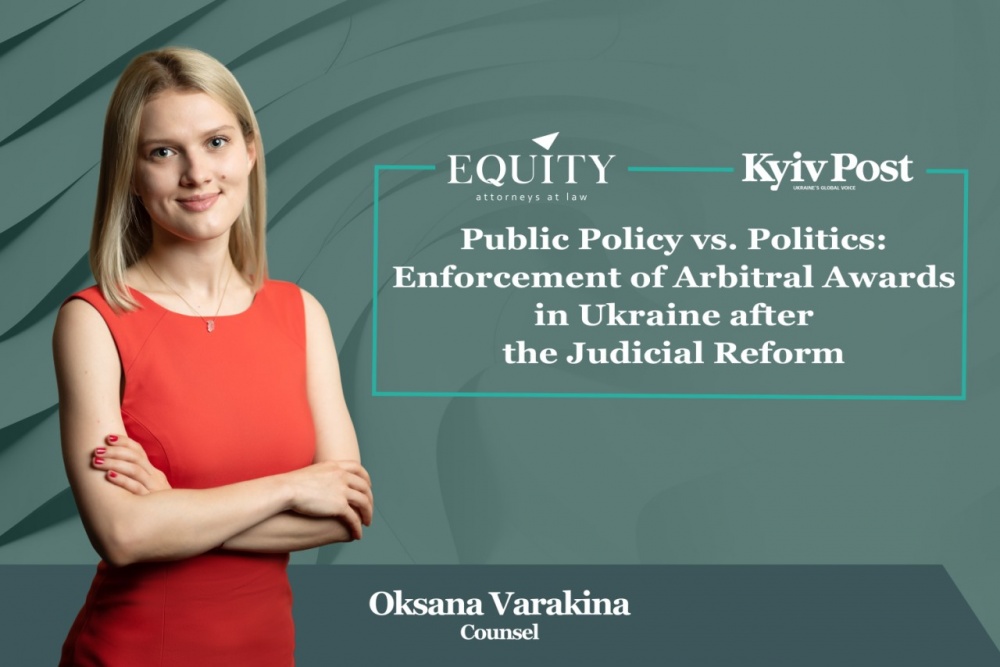Public Policy vs. Politics: Enforcement of Arbitral Awards in Ukraine after the Judicial Reform

Ukrainian judiciary has been notorious for the broad interpretation of the notion of public policy, often going into the merits of arbitral awards. 1,5 years since the latest milestone in reforming the state’s judicial system, we analyse whether the reform has brought about any changes to the mentioned approach.
Award under a Crimea-related contract: Posco Daewoo Corporation and Hyosung Corporation v. Ukrenergo
Under the contract entered into in 2012, a consortium of companies, including the applicants, undertook to carry out a modernization of an electric power substation in Crimea. By February 2014 the applicants had supplied 73% of the equipment, the rest was manufactured but not yet supplied. Ukrenergo, which is a state enterprise in charge of the operational and technological control of the integrated power grid of Ukraine, failed to make any payments under the contract. The applicants obtained a VIAC award in their favour and applied for its enforcement in Ukraine.
Ukrenergo opposed the enforcement. It argued that the payment for the equipment supplied to Crimea which is now used by the Russian authorities would equate to the financing of terrorism in violation of the public policy of Ukraine. Furthermore, enforcement against Ukrenergo would allegedly impair the national security and economy, since the enterprise would not be able to ensure the reliable operation of the power system.
The Supreme Court rejected Ukrenergo’s arguments. It interpreted public policy as the legal order of the state and the fundamental principles underlying the state system, including its independence, integrity, autonomy, inviolability and the fundamental constitutional rights, freedoms, guarantees etc.
The Supreme Court found no contradiction to the public policy based on the facts of the case. It concluded that the location of the equipment in Crimea may not excuse the failure to perform contractual obligations, particularly, if the majority of the equipment was supplied prior to the occupation of the territory. The Court was also not persuaded by the alleged gravity of the awarded amount for the financial performance of Ukrenergo.
Award affected by sanctions: Avia FED Service v. SJSHC “Artem”
In December 2014, SJSHC “Artem” undertook to supply certain military goods to Avia FED Service, the Russian customer. The Ukrainian company failed to supply any goods or to return the down payment. In Ukrainian courts, it objected to the enforcement of the arbitral award rendered in favour of Avia FED Service based on the public policy ground.
Artem claimed that Avia FED Service had entered into the supply contract to perform its obligations to the enterprises of the military sector of Russia which fall under the sanctions adopted by the National Security and Defence Council of Ukraine and enacted by the President of Ukraine. Therefore, enforcement of an arbitral award to the ultimate benefit of the companies under sanctions would violate the public policy of Ukraine. The district court and the appellate court upheld the argument.
The Supreme Court reversed lower courts judgments and ruled that the enforcement of the arbitral award in question does not impair the public policy of Ukraine. It remitted the case for reconsideration.
The Supreme Court concluded that enforcement of an award in favour of a Russian company is not contrary to the public policy, given that the political situation in the region does not affect private legal relations and the assumed contractual obligations.
Concluding remarks
The comprehensive judicial reform has started to yield results in improving Ukraine’s image as an arbitration-friendly jurisdiction. In its interpretation of public policy, the Ukrainian highest judicial authority now appears to follow the gold standard that the “provision was not meant to enshrine the vagaries of international politics under the rubric of ‘public policy’”.
